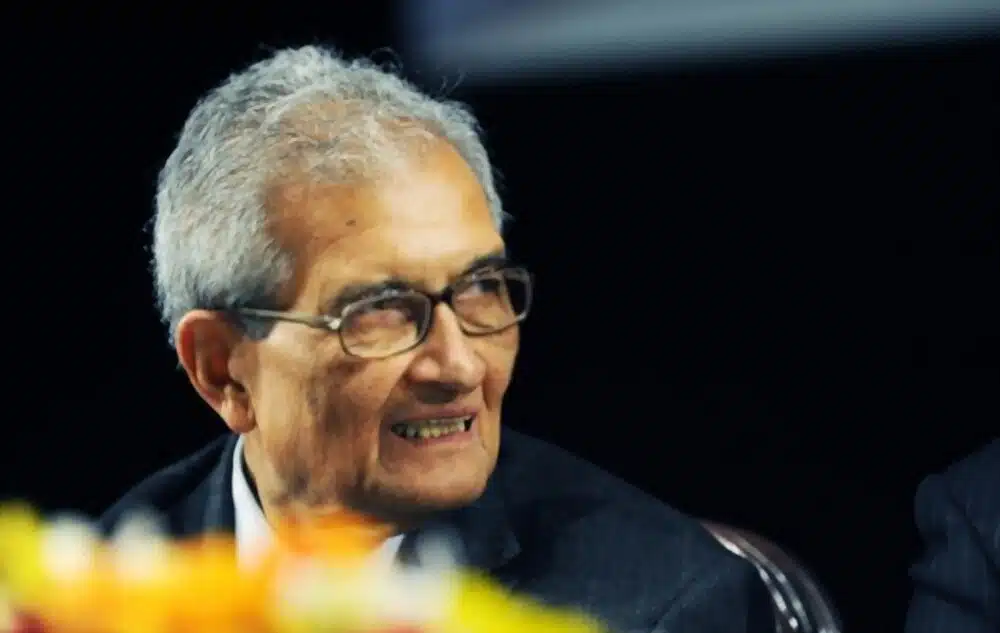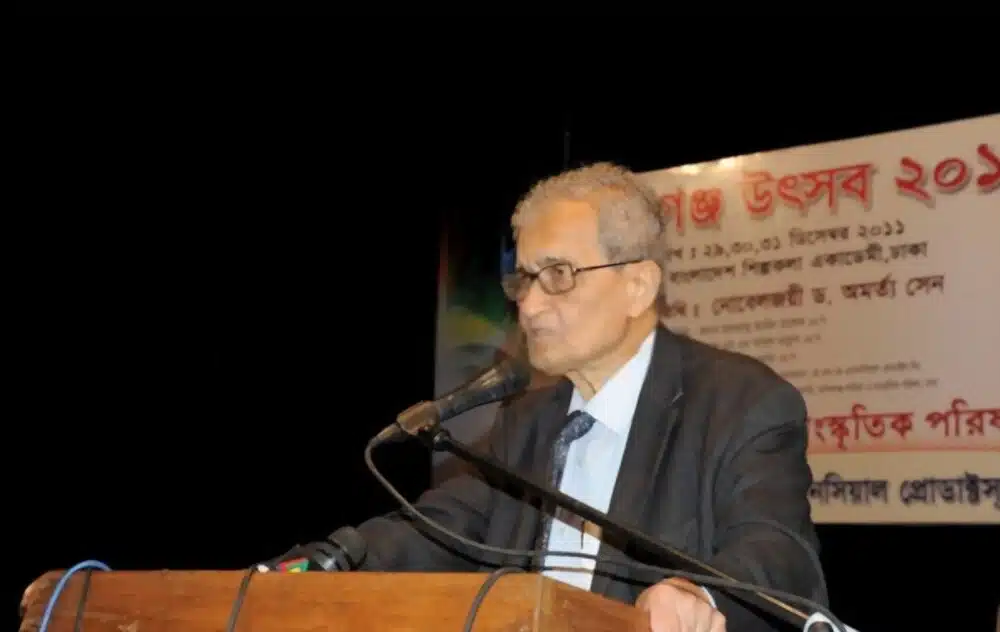
Write a bio-sketch in about 80 words using the information given below.
- Birth: November 3, 1933
- Contributions: work on famine, human development theory
- Education: studied in Delhi School of Economics, BA and PhD from Trinity College, Cambridge
- Profession: a Thomas Lamont University Professor of Economics
- Achievement: a fellow at Trinity College, first Indian to head the Oxford University, 1998 to 2004
- Recognition: Nobel Prize for Economics (1998) for his work on welfare economics, Indira Gandhi Gold Medal Award of the Asiatic Society (1994), Bharat Ratna (1999)
Ans:- Amartya Sen (birth: 1933) is an Indian economist. He won the Nobel Prize for his work on welfare economics (1998), The recipient of the Indira Gandhi Gold Medal of Asiatic Society was also awarded Bharat Ratna (1999). After graduating from the Delhi School of Economics, he did his BA and then went on to do PhD from Trinity College, Cambridge. A fellow at Trinity College, he was the first Indian academic to head the Oxford University from 1998 to 2004. He is currently a professor of Economics at Thomas Lamont University.
Download the above Biographical Sketch in PDF (Printable)
Amartya Sen Biography in Short– 100 Words
Amartya Sen is one of the world’s most influential economists. He has been described as an “intellectual giant.” He conducted groundbreaking research on development economics, public policy, welfare programs, social justice, and poverty alleviation. His work has made a significant impact on how we comprehend the global economy today. His unique approach to economic analysis focused on human capabilities rather than just material goods. He has also helped in making policies that benefit people around the world. His contributions have had a lasting impact in many fields of study. His personality will continue to be felt for years to come.
Also Read:
- Sketch of Dr. B.R. Ambedkar
- John Winston Lennon Biography
- Biography Kiran Bedi
- Subhash Chandra Bose Biography
- Narendra Modi Essay
Amartya Sen Biography for School Students– 150 Words
Amartya Sen’s life story inspires and enlightens everyone. He was born in India in 1933. he grew up during a time of great social and political change. As a child, he witnessed the impact of poverty and inequality on his community. After observing all this he grew his interest in economics.
Throughout his academic career, Sen has been dedicated to studying issues such as social choice theory, welfare economics, and development economics. He has written many books and articles on many topics which have earned him numerous awards including the Nobel Memorial Prize in Economic Sciences.
However, Amartya Sen’s contributions extend beyond academia. He is also recognized for advocating human rights across the world through championing democratic governance and working tirelessly to eliminate poverty.
Despite facing personal challenges throughout his life including illness and political persecution, Amartya Sen continues to be an influential figure who inspires others with his unwavering commitment to making our world a better place.
Amartya Sen Nobel Prize Winner Biography – 200 Words

Amartya Sen is one of the most renowned and influential thinkers of our time. His achievements and contributions in various fields have earned him widespread recognition and admiration. His Sen’s exceptional scholarship has been primarily focused on economics, philosophy, and social welfare. As an economist, he revolutionized development economics by introducing the concept of “capability approach”. It was a means to evaluate human well-being beyond income or wealth measures alone.
He also explored issues such as inequality, poverty, famine, democracy, gender studies with his interdisciplinary work. He got immense praise from experts across different disciplines. Moreover, Amartya Sen’s philosophical inquiries into justice and ethics have made significant contributions to political theory worldwide.
His writings on these subjects have earned him accolades including the Nobel Prize in Economics in 1998. He was awarded the Nobel Prize for his research on welfare economics which focuses on how people make choices to improve their lives. He made this great idea while dealing with constraints like poverty or illness among others.
In essence, Amartya Sen’s vast body of work speaks volumes about his intellectual prowess not only within academia but also beyond it. He continues to influence scholars seeking solutions to global challenges.
Amartya Sen Biography Sketch – 300 Words
Amartya Sen is a towering figure in the realm of economics, social justice, and philosophy. He was born in India in 1933. He has had a storied career spanning decades that began with his early years as an academic at Jadavpur University.
He continued to prestigious institutions such as Trinity College at Cambridge University, where he earned his PhD. A recipient of numerous accolades including the Nobel Prize for Economics in 1998 and the Bharat Ratna – India’s highest civilian award.
Sen has been recognized internationally for his groundbreaking work on issues such as poverty, development economics and welfare theory. His seminal book “Development as Freedom” remains one of the most widely referenced works on economic development till this date.
His contributions to social choice theory have earned him widespread praise from academics around the world. But beyond just being a prolific scholar, Amartya Sen is also known for his impassioned advocacy for human rights.
He particularly fought for the marginalized communities – which has made him a beloved figure among activists worldwide. Today, even in his late eighties, he continues to be vocal about issues close to his heart; whether it’s speaking out against injustice or offering solutions to some of society’s most pressing problems – Amartya Sen remains an inspiration not just to economists but all who seek greater equity and compassion in our world today.
In conclusion Amartya Sen’s development is a comprehensive and useful framework for understanding the complexities of global poverty. His emphasis on expanding capabilities, through investments in education, health, and other public goods provides a pathway to prosperity for people everywhere. The concept of human flourishing provides an inspiring goal in route to tackling global inequality and creating more equitable societies. Amartya Sen has left us with invaluable insights into how we can tackle world poverty.
Amartya Sen Biography for College Students- 500 + Words

Amartya Sen, a Nobel laureate and one of the most renowned economists of our time, is an incredible figure with a fascinating life story. He has made significant contributions to various fields, including economics, social choice theory, political philosophy, and welfare economics.
Let’s learn a little more about his life and career to explore the different facets that have earned him worldwide recognition. Join me as we take a closer look at Amartya Sen’s early life and education, career achievements and research ideas that have impacted society globally.
Early life and education
Amartya Sen was born in Santiniketan, India, on November 3rd, 1933. His family background was one of intellectual and academic excellence. His father Ashutosh Sen was a renowned professor of chemistry at Dhaka University.
Growing up, Amartya learned a great deal from his parents and their friends who were academics themselves or involved in social activism and politics. He developed an early interest in literature, philosophy and mathematics.
Sen’s primary education took place at the Visva-Bharati University founded by Nobel laureate Rabindranath Tagore where he had access to an innovative educational approach that combined Eastern traditions with Western learning methods.
In 1951 he went on to study economics at Presidency College in Calcutta where he earned both his undergraduate and master’s degrees. Later, he studied for a doctorate degree at Trinity College Cambridge under the supervision of Joan Robinson – another famous economist.
Amartya Sen’s early life gave him ample exposure to diverse subjects which later helped shape his interdisciplinary approach towards research ideas.
Career
Amartya Sen’s career is one that spans decades and has been marked by numerous achievements. After completing his education at Presidency College in Kolkata, India, he went on to pursue a PhD from Trinity College, Cambridge. He then held various teaching positions in universities around the world.
In 1977, Sen joined Harvard University as a professor of economics and quickly became a leading figure in development economics. His contributions to the field have been groundbreaking and influential.
Throughout his career, Sen has also worked with international organizations such as the United Nations Development Programme (UNDP) and the World Health Organization (WHO). He has advised governments on economic policy and social welfare programs.
Aside from his academic work, Amartya Sen is also known for being an active public intellectual who advocates for human rights and social justice. He has written extensively on issues related to poverty, inequality, democracy, gender equality and healthcare.
Amartya Sen’s illustrious career continues to inspire generations of scholars across multiple disciplines worldwide.
Research and ideas
Amartya Sen is known for his extensive research and groundbreaking ideas in the fields of economics, social choice theory, political philosophy, and welfare economics. His work on poverty and famine has been particularly influential.
One of Sen’s key contributions to economic thought was the development of “capability approach,” which emphasizes that people’s well-being should be measured not only by their material possessions but also by their ability to do what they value in life. This approach has had a significant impact on how policymakers think about human development.
Sen’s work on social choice theory challenged conventional views about rational decision-making. He argued that individuals have diverse preferences and values that cannot always be aggregated into a single societal preference function.
In addition to his academic writing, Sen is also known for his popular books such as “Development as Freedom” which argues that freedom is an essential component of development. This book has inspired many scholars and policymakers around the world.
Amartya Sen’s research and ideas have had a profound impact on multiple fields of study, challenging established theories and providing innovative approaches to some of the world’s most pressing problems.
Awards and recognition
Amartya Sen’s work and contributions to the fields of economics, philosophy, and social justice have been widely recognized and celebrated through various prestigious awards.
In 1970, Sen received the John Bates Clark Medal for his significant contributions to economic theory. He was also awarded the Nobel Memorial Prize in Economic Sciences in 1998 for his pioneering work on welfare economics.
Sen has been honored with numerous other accolades throughout his career, including India’s Bharat Ratna Award (1999) and Japan’s Order of the Rising Sun (2007). In addition to these national honors, he has also received several international recognitions such as The Eisenhower Medal (2013), Edinburgh Medal (2017) among others.
Sen is an honorary fellow of several academic institutions around the world including Trinity College Cambridge, Nuffield College Oxford and Harvard University. Furthermore, he served as President of American Economic Association in 1981.
These awards are a testament to Amartya Sen’s exceptional scholarship that has influenced public policy worldwide. His ideas on social choice theory have revolutionized modern economic thought while his advocacy on human rights continues to inspire generations globally.
Personal life
Amartya Sen’s personal life is as fascinating as his professional achievements. Born in Santiniketan, Bengal, India on November 3rd, 1933, he was the son of a distinguished Indian academic family. His father Ashutosh Sen was a professor of chemistry at Dhaka University and his mother Amita Sen was an accomplished writer and poet.
Sen grew up surrounded by intellectual discussions and diverse artistic interests which would shape his own passions later in life. He went on to study at Presidency College in Kolkata before earning a BA from Trinity College, Cambridge followed by a PhD in economics from the same institution.
Despite many career opportunities abroad, including teaching positions at Harvard University and Oxford University where he eventually became Master of Trinity College; Sen remained committed to raising awareness about social issues affecting India throughout his career.
In addition to being a Nobel laureate economist with numerous publications under his belt, Amartya Sen is also known for being multilingual (speaking Bengali, Hindi, English and French), an avid music enthusiast (particularly fond of Rabindra Sangeet) and even played the tabla professionally during college!
Sen’s passion for education extends beyond academia – having been instrumental in establishing schools across rural parts of India through The Pratichi Trust which he founded alongside wife Emma Georgina Rothschild who herself holds an impressive academic record as Professor Emeritus at Harvard University.
Amartya Sen’s personal life has been just as remarkable as his professional one – characterized by creativity, curiosity, empathy towards others paired with an unwavering dedication toward social justice.
Bibliography
If you are interested in learning more about this remarkable man’s life and work, there are several books available that offer an in-depth exploration of his ideas and contributions. Some notable titles include “Development as Freedom,” “The Argumentative Indian,” “Identity and Violence: The Illusion of Destiny,” among others.
Whether you’re a student or just someone interested in delving deeper into some of the most pressing issues facing society today, reading Professor Amartya Sen’s works is sure to provide valuable insights that can help us all better understand how we can work together towards building a more just and equitable world.
Conclusion
Amartya Sen has been truly an inspirational figure due to his vast contributions to the fields of economics and philosophy.
His Nobel Prize-winning work on welfare economics has had a profound impact on our understanding of poverty and social justice, making him one of the most influential thinkers in modern times.
His life story serves as an example for all aspiring academics, demonstrating that hard work and dedication can lead us to make extraordinary accomplishments.